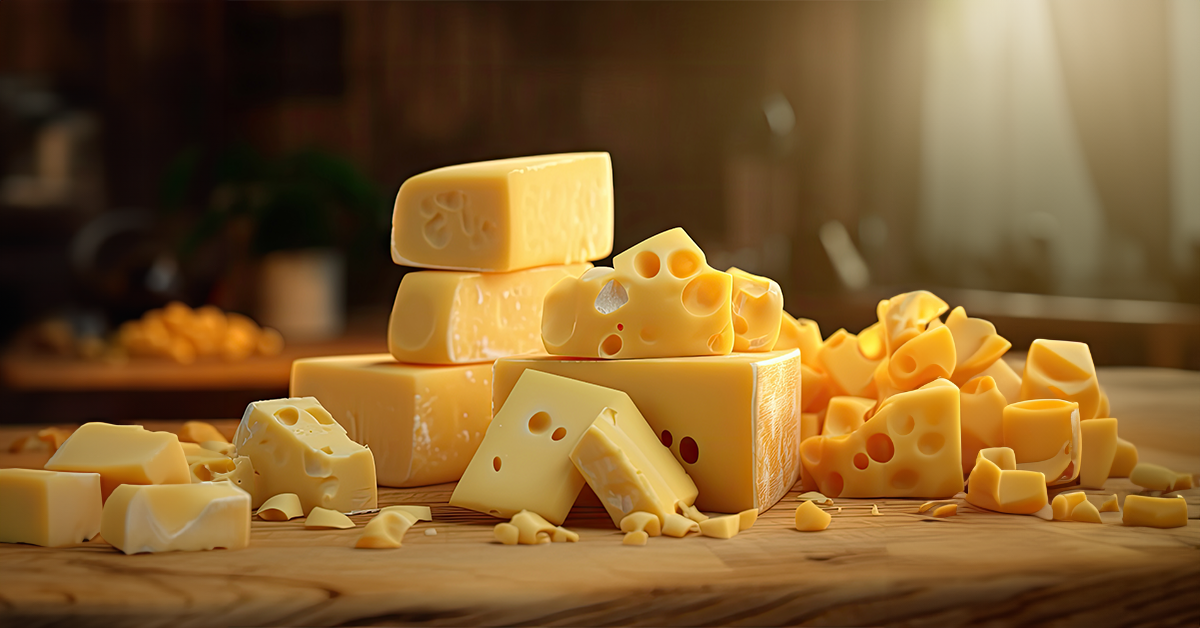Is Cheese Good for Weight Loss?

We all love how cheese makes our favorite foods taste better, whether it’s on pizza, in a sandwich, or mixed into pasta. But cheese isn’t something that was always part of Indian diets, so many of us aren’t sure how it affects our health, especially when it comes to losing weight.
If you’re trying to reduce weight and enjoy eating cheese, you might be asking yourself if it’s okay to keep it in your diet. Let’s take a closer look.
What is the Nutritional Value of Cheese?
Cheese is a rich source of calcium, protein, and fats. These nutrients are vital for overall health, especially for bone strength and muscle maintenance. However, cheese can also be high in calories and saturated fats, which is need to be considered carefully.

Can Cheese Actually Be Part of a Weight Loss Diet?
Cheese can be part of a weight loss diet, but it requires mindful eating. Cheese is rich in protein and calcium, which are beneficial, but it’s also calorie-dense and high in saturated fat.
The key to including cheese in your diet without hindering weight loss is to consume it in moderation and be mindful of portion sizes.
Is your weight increasing your health riskHealthy Weight
Calculator
Is Cheese Good for Weight Loss?
In general, cheese is not the best food choice when you are aiming for weight loss. Although it offers nutritional benefits like protein and calcium, the high calorie and fat content make it easy to overconsume.
Even small portions of cheese can be calorie-dense, which can slow down your progress if you’re trying to create a calorie deficit. To top this, cheese is often consumed with high-calorie foods like bread and pasta, making it harder to stick to a weight loss plan.
What Are the Best Cheeses for Weight Loss?
In India, finding a wide variety of cheese in local markets can be challenging. Most of us are familiar with just a few common brands available in grocery stores and supermarkets.
Cheeses like mozzarella, feta, and brie are not always easy to find, and many people may not even know about them. However, regardless of the type of cheese, it’s important to be mindful of portion sizes.
If you’re trying to lose weight, it’s best to enjoy cheese in portions as small as possible. This way, you can still savor the rich taste of cheese without consuming too many calories.
How Cheese Can Aid Weight Loss?
Cheese can support weight loss if you eat it in the right way. It’s a good source of protein, which helps your muscles, especially if you’re exercising. Also, cheese doesn’t raise your blood sugar much, so it can help keep your energy levels steady throughout the day.
However, these benefits only come into play when cheese is eaten in moderation and balanced with other nutrient-rich foods.
What are the Potential Downsides of Cheese?
Despite its benefits, cheese has several downsides when it comes to weight loss:
- High in Saturated Fat: This can contribute to weight gain and may slow down your metabolism, making it harder to lose weight.
- Calorie-Dense: A small amount of cheese can pack a lot of calories, which can lead to overeating and hinder weight loss progress.
- High Sodium Content: Many cheeses are high in salt, which can cause water retention, leading to bloating and making it difficult to gauge actual weight loss.
- Portion Control Challenges: Cheese is often easy to overeat, particularly when it’s added to comfort foods like pasta, sandwiches etc, making it challenging to control calorie intake.
Fitterfly – Smart Portion Control Tips
Tips on Portion Control and Pairing Cheese with Other Healthy Foods
If you decide to include cheese in your weight loss plan, here are some tips to do it wisely:
1. Control Portions
In our local grocery stores, cheese is typically available in slices (20 grams), cubes (25 grams), or blocks (250 to 500 grams). Stick to a small cube (25 grams, approximately 2 tablespoons) to keep your calorie intake in check. A little bit of cheese can add a lot of flavor without piling on too many calories.
2. Pair with High-Fiber Foods
Combine cheese with fiber-rich foods like whole grains or vegetables. This can help you feel fuller for longer and balance out the overall calorie content of your meal.
3. Choose Lower-Fat Varieties
If available, opt for cheeses that are lower in fat, like mozzarella or cottage cheese (chenna paneer or low-fat paneer). These options are lower in calories but still provide important nutrients.
4. Use as a Flavor Enhancer
Instead of making cheese the main component of your meal, use it sparingly to enhance the flavor of your dishes. A small sprinkle on a salad or over-roasted vegetables can go a long way.
How We At Fitterfly Can Help You?
Many of our Fitterfly Weight Loss Program members love cheese, whether it’s melted on pizza, sprinkled over pasta, spread on chapati, or stuffed in a sandwich. Our Nutrition Coaches advise them that they can always continue enjoying cheese while being mindful of portion sizes and choosing lower-fat options like cottage cheese or paneer, which are easily available in a nearby dairy shop or can be made at home.
This balance is where Fitterfly can help. Our weight loss programs are designed to let you enjoy your favorite foods while still achieving your goals. We provide personalized diet plans that include a variety of nutritious foods and exercise routines that fit your lifestyle, along with guidance on maintaining your mental well-being.
Take the first step by giving us a missed call at 08068507599, and one of our program advisors will reach out to you!
Lost 11 kg in 3 months with… Fitterfly’s easy diet plan


66kg
Happy members
EMI
Guarantee
4.8/5
Weight Loss Program
This blog provides general information for educational and informational purposes only and shouldn't be seen as professional advice.
Frequently Asked Questions
What type of cheese is best for weight loss?
Lower-calorie options like cottage paneer, mozzarella, and feta are better choices if you’re trying to lose weight.
How much cheese should I eat for weight loss?
Stick to small portions, such as a single slice or about 25 grams per serving.
Can you eat cheese every day and still lose weight?
It’s possible, but you need to monitor your portion sizes and overall calorie intake carefully.
Does cheese cause weight gain if eaten in excess?
Yes, consuming too much cheese can lead to weight gain due to its high calorie and fat content.
Is low-fat cheese better for weight loss?
Low-fat cheese can be a better option as it contains fewer calories and less fat, but it’s still important to watch your portion sizes.
How does cheese help with satiety and appetite control?
Cheese is rich in protein and fat, which can help you feel fuller for longer. However, the high-calorie content means it should be consumed in moderation.
What are the healthiest cheeses to include in a weight loss diet?
Cottage cheese, mozzarella, and feta are good options due to their lower calorie and fat content.
Is it better to choose hard or soft cheeses for weight loss?
Soft cheeses like cottage cheese or fresh mozzarella tend to be lower in calories than hard cheeses like cheddar or parmesan.
Is cheese slice good for weight loss?
Cheese slices can be part of a weight loss plan if consumed in moderation, but they are often high in calories and fat.
Is cheese popcorn good for weight loss?
Cheese popcorn is generally not a good choice for weight loss due to its high calorie and fat content, especially if it’s a processed snack.
Is cheese cube good for weight loss?
Cheese cubes can be high in calories, so it’s best to enjoy them in small amounts.
Is cheddar cheese healthy for weight loss?
Cheddar cheese is calorie-dense, so it’s not the best choice for weight loss, though small portions can be included in a balanced diet.
Is cheese omelette good for weight loss?
A cheese omelette can be part of a weight loss plan if made with minimal cheese and paired with vegetables or a side of fruit.
Is processed cheese good for weight loss?
Processed cheese is typically high in calories, fat, and sodium, making it a less ideal choice for weight loss.
Is cheese sandwich good for weight loss?
Cheese sandwiches can be calorie-heavy, especially if made with a lot of cheese and processed bread, so it’s best to consume them sparingly.
Is cheese spread good for weight loss?
Cheese spread is often high in calories and fat, so it’s not the best option for weight loss. If you do choose to use it, do so in moderation.
What are the best cheeses that are particularly beneficial for weight loss?
As mentioned in the blog, it's tough to find a wide variety of cheeses like mozzarella, feta, and brie. However, no matter what cheese you choose, it's important to keep portion sizes small. This allows you to enjoy the taste without adding too many calories, making it easier to fit cheese into a weight-loss diet.



















